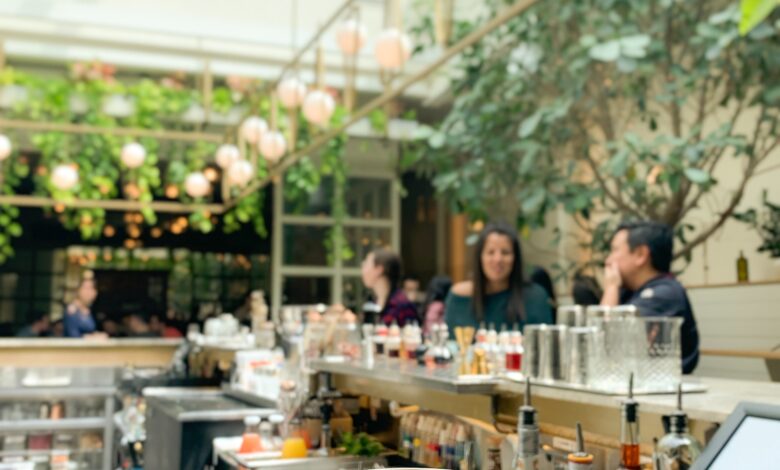6 Ways Coffee Shops Are Embracing Sustainable Practices

Here’s how coffee shops around the world are adopting sustainable practices to reduce their environmental impacts for a greener future.
In recent years, there has been a growing global movement towards sustainability and environmental consciousness. This movement has had a significant impact on various industries, this includes the coffee shop industry as well. Coffee shops, often considered hubs of socialization and relaxation, have recognized the need to embrace sustainable practices in order to reduce their ecological footprint and contribute to a greener future.
Sourcing of Sustainable Coffee Beans
Sustainable coffee cultivation involves practices that prioritize the preservation of ecosystems, support fair trade, and ensure the well-being of farmers. Many coffee shops have started partnering with certified organic coffee suppliers and fair trade cooperatives to ensure that their beans are ethically and sustainably sourced. By doing so, they not only reduce the environmental impact of their operations but also support small-scale farmers who employ environmentally friendly methods.
Reducing Waste and Promoting Recycling
One of the most visible steps in this regard is the adoption of compostable or biodegradable coffee cups. Traditional coffee cups are often lined with plastic, making them non-recyclable and harmful to the environment. Green cafes, however, are using cups made from renewable materials such as plant-based plastics, bamboo, or even recycled paper. These cups decompose naturally, minimizing the amount of waste ending up in landfills or oceans.
Reducing Energy Consumption
Many coffee shops are investing in energy-efficient equipment, such as low-energy espresso machines and LED lighting. They are also using renewable energy sources like solar panels to power their operations. By reducing their energy consumption and utilizing green energy, coffee shops can significantly lower their carbon emissions and contribute to a cleaner environment.
Water Conservation
Coffee production requires a substantial amount of water, and green cafes are adopting measures to minimize water waste. This includes installing water-efficient equipment, such as high-efficiency dishwashers and low-flow faucets. Additionally, some coffee shops are implementing water recycling systems to reuse water for non-drinking purposes like cleaning or irrigation.
Green Infrastructure

Cafes can prioritize the use of reclaimed or recycled wood, non-toxic paints, and energy-efficient lighting. They incorporate natural elements such as plants and green walls to improve indoor air quality and create a calming and sustainable ambiance. Some cafes even design their spaces with energy-efficient layouts, maximizing natural lighting and ventilation to reduce the need for artificial lighting and air conditioning. Green cafes often obtain certifications and labels that validate their eco-friendly practices. Certifications such as LEED (Leadership in Energy and Environmental Design) demonstrate a cafe’s dedication to sustainability and social responsibility.
Plastic neutrality and Carbon neutrality
Plastic neutrality entails balancing the usage of plastic by ensuring an equivalent amount of plastic waste is recovered and recycled and prevented from entering the ecosystem. On the other hand, Carbon neutrality refers to the balance between the amount of carbon dioxide (CO2) emissions released into the atmosphere and the amount of CO2 removed or offset from the atmosphere.
Cafes can become plastic-neutral by avoiding single-use plastic products, implementing recycling programs, and through proper waste management systems. They can get also carbon neutral certification by using renewable or energy-efficient appliances, reducing or removing greenhouse gas emissions in an effective way.
Sustainable Practices Adopted by some leading Coffee Companies
In India, two renowned brands SLAY Coffee, and Blue Tokai have taken initiatives toward sustainability by adopting Plastic Neutrality with The Disposal Company.
Starbucks committed to a resource—positive future, formalizing environmental goals to cut its carbon, water, and waste footprints by half by 2030. They are focusing on reusable packaging, waste management, expanding plant-based menu options, investing in regenerative agriculture, reforestation, forest conservation, and water replenishment.
Costa Coffee partnered with the Rainforest Alliance to source 100% of their famous beans to their high standard. They are also exploring new ways to partner with farmers to tackle the effects of climate change and support their livelihoods.
Dunkin’ Donuts launching a new program called the Dunkin’ Drive — To Sustainability Program, committing to 100% responsibly sourced coffee by 2025. They are also working to make a difference in the lives and livelihoods of coffee farmers and producers.
The Bottom Line
Green cafes are transforming the coffee shop industry by embracing sustainable practices and promoting environmental consciousness. By collectively embracing sustainability, we can create a more environmentally friendly and socially responsible coffee culture that benefits both present and future generations.
With its pioneering climate action platform, The Disposal Company is leading the charge towards a sustainable future in India, enabling brands to go plastic-neutral and carbon-neutral with ease. Discover more here.




